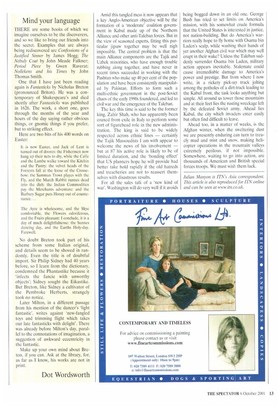Mind your language
THERE are some books of which we imagine ourselves to be the discoverers, and so we like to bring our friends into the secret. Examples that are always being rediscovered are Confessions of a Justified Sinner by James Hogg; The Nebuly Coat by John Meade Falkner; Period Piece by Gwen Raverat; Nollekens and his Times by John Thomas Smith.
One that I have just been reading again is Fantasticks by Nicholas Breton (pronounced Briton). He was a contemporary of Shakespeare's and died shortly after Fantasticks was published in 1626. The work, a short one, goes through the months of the year and hours of the day saying rather obvious things, or gnomic things if you prefer, but to striking effect.
Here are two bits of his 400 words on Easter:
It is now Easter, and Jack of Lent is turned out of doores: the Fishermen now hang up their nets to dry, while the Calfe and the Lambe walke toward the Kitchin and the Pastry: the velvet heads of the Forrests fall at the loose of the Crossehow: the Samman Trowt playes with the Fly, and the March Rabbit runnes dead into the dish: the Indian Commodities pay the Merchants adventure: and the Barbary Sugar puts Honey out of countenance.. .
The Ayre is wholesome, and the Skye comfortable, the Flowers odoriferous, and the Fruits pleasant: I conclude, it is a day of much deliRhtfulnesse: the Sunnes dancing day, and the Earths Holy-day. Farewell.
No doubt Breton took part of his scheme from some Italian original, and details seem to be shoved in randomly. Even the title is of doubtful import. Sir Philip Sidney had 40 years before, so I learn from the dictionary, condemned the Phantastike because it Infects the fancie with unworthy objects'; Sidney sought the Eikastike. But Breton, like Sidney a cultivator of the Pembroke Herberts, strangely took no notice.
Later Milton, in a different passage from his mention of the dancer's 'light fantastic', writes against 'new-fangled toys and trimming flight which takes our late fantasticks with delight'. There was already before Milton's day, parallel to the connotations of imagination, a suggestion of awkward eccentricity in the fantastic.
Make up your own mind about Breton, if you can. Ask at the library, for, as far as I know, his works are not in print.
Dot Wordsworth


































































































 Previous page
Previous page